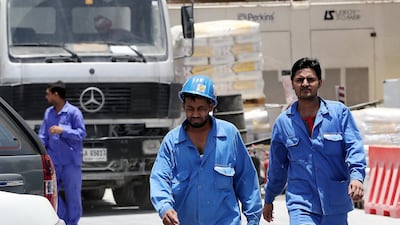As temperatures climb, loose-fitted clothing, drinking water regularly, staying away from fizzy drinks and promptly reporting episodes of headache and nausea can prevent heatstroke and hospitalisation.
That is the essential advice from a leading doctor as the UAE summer continues to rage.
“Prevention is the key word for protection against the sun. Whether you work outdoors or not, two to three glasses of water every hour is ideal. There must be adequate fluid intake because the ambient temperature is high,” said Dr Alai Taggu, specialist physician and head of department of critical care medicine at Aster Hospital.
“Plain water with lemon is advisable, definitely not carbonated drinks and not tea, coffee since that causes us to perspire more.”
Workers who are on diuretics to treat hypertension, high blood pressure or on heart medication such as beta blockers should be doubly careful because these can interfere with the body’s response to heat.
“Many workers tend to have hypertension and are taking such medication because of the nature of their work. Diuretics flush water from the body so can add to dehydration. This increases the risk of heat stroke for already high risk patients,” he said.
A person with heatstroke symptoms such as headache and nausea should be moved to a cool, shaded area since left unattended the consequences are potentially deadly, ranging from turning delirious to eventually slipping into a coma and suffering multi-organ failure.
“Supervisors must check that workers do not sleep in cars because keeping the air conditioning on will not be enough. The temperature of a person can shoot up and they get dehydrated very quickly,” said Dr Taggu, who has treated workers brought in for treatment because they dozed off for extended hours in vehicles exposed to sunlight.
The warning comes as outdoor workers prepare for the start of the midday break on friday
While calling for emergency medical help, quick measures that can be taken include removal of excess clothing, dousing the person with a hose available on most construction sites and placing ice packs or cold towels on the person’s body.
_______________
Read more:
Watch: Cooling vest saves Dubai workers from heat stroke
UAE doctors see increase in heat-related illnesses as temperatures soar
________________
“A person’s mental state and behaviour will be different, they may become irritable, their skin will be flushed during a heat stroke. If a patient is not sweating, this means they are already in a stage of heat exhaustion. Once the body overheats then emergency treatment is a race against time,” he said. “Rather than rushing a person to the hospital if checks and measures are put in place, emergency situations can be avoided.”
As per government rules, water, vitamin supplements and shelter must be made available at all work sites to meet health and safety requirements. The law mandates that workers are not assigned outdoor work from 12.30pm until 3pm from June 15 until September 15.


